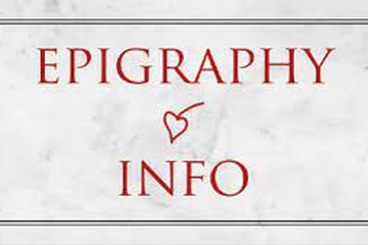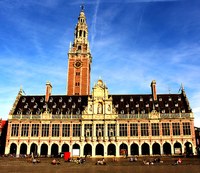This event connected with the Epigraphy.info workshop will be dedicated to an EpiDoc training with a focus on Mycenaean inscriptions, the READ platform applied to epigraphic texts and the presentation of the project's outputs. Participation will only be possible in presence and after registration.

Date: 24 APRIL 2023 from 9:30 to 17:30
Event location: Museum Room (MSI1 02.08). KU Leuven's Faculty of Arts, Blijde Inkomststraat 21, 3000 Leuven
Type: Training events

Monday 24 April
09:30 - 10:00 - Coffee & Community
10:00 - 11:00 - Welcome (Mark Depauw) & ENCODE outputs
11:00 - 13:00 - EpiDoc for Mycenaean inscriptions (Gabriel Bodard, Federico
Aurora, Alice Bencivenni & Marta Fogagnolo)
13:00 - 14:00 - Lunch
14:00 - 15:15 - READ for epigraphists (Stephen White)
15:15 - 15:45 - Coffee break
15:40 - 17:00 - READ for epigraphists (Stephen White)
17:15 - 17:45 - Guided visit to the Archaeological Museum of the Faculty of Arts
18:00 - Poster session Epigraphy.info & reception
Tuesday 25 April and Wednesday 26 April: Epigraphy.info VII Workshop
Mycenaean Greek texts (ca. 1350-1150) are written in a syllabary that we call Linear B. In scholarly editions they are usually transcribed using Latin letters and a system (Wingspread Conventions) similar to, but not identical with, the Leiden Conventions. Digital encoding of Mycenaean texts (as in the online databases DAMOS and LiBER), at the moment, has not made use of EpiDoc. However, to facilitate work on Mycenaean inscriptions to conform to FAIR principles (e.g. to make exchange and reuse of data by other epigraphical databases easier) work on the alignment of EpiDoc with Mycenaean usage (https://epidoc.stoa.org/gl/latest/app-epi-mycenaean.html) was recently started and published as an appendix to the EpiDoc-guidelines. The workshop will be a hands-on, collaborative, group work on completing the alignment of EpiDoc with the Wingspread Conventions, with the aim – in addition to provide a new encoding tool for Mycenologists – of giving and in-depth picture of the workings of EpiDoc and how it can be adapted to different epigraphic traditions. Participants are required to get acquainted with the basics of EpiDoc and of Myceanean transcription beforehand (material will be provided to successful applicants).
READ (Research Environment for Ancient Documents) is an open source software system supporting the scholarly study of ancient texts on their physical carriers. It provides editing facilities for philology and at its basic level allows the researcher to link images of a scribed object with a transcription of the text represented. It is capable of handling multiple transcriptions of the same object in parallel. This workshop will introduce the researcher to the basic workflows in READ for linking original-language texts to transcriptions with the specific goal of demonstrating READ’s paleographic features. Attending this workshop should give the participants a basic understanding of the READ workspace, the ability to add an image to a READ text, the ability to add an transcription to a READ text, the ability to annotate boundaries of glyphs on the image, the ability to link transcription to the glyphs on the image, the ability to navigate the paleography report generated by READ. This workshop will be accessing READ through participants personal computer through a web connection and will use a supplied image and transcription. Participants can indicate in the registration form if they would like to possibly use their own example (note that using your own text will require more work on the participant). The version of READ we will use in this workshop will handle text in Latin, Greek or Coptic.
The International Digital Epigraphy Association (IDEA) will provide scholarships for early-career scholars to participate in the next Epigraphy.info event (Leuven, 24-26 April 2023) by presenting a paper or poster coherent with the activities and aims of the Association.
Applicants should send a short curriculum vitae, the abstract of their paper or poster, and a cover letter motivating how their work fits in with the objectives of IDEA to info@eagle-network.eu.
For further details see the attached call for applications.